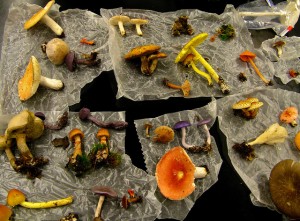Increasingly, I object to collecting mushrooms for the table. I’m not referring to one’s own dinner table. Nor am I referring to commercial pickers, who are collecting for financial purposes rather than the table. Rather, I’m referring to the collection tables that occupy pride of place at local and regional mushroom forays.
Here’s the scenario: a brigade of mycophiles lights out for the woods, armed with capacious baskets. Into those baskets, they’ll toss any specimen they find, then bring back those specimens for the foray’s experts (so-called?) to sort and identify. Often the specimens will be accompanied by a dearth of data. What was the substrate? Under a tree. That sort of thing. Then the experts will place names on them with such alacrity that they could be tossing confetti. Never mind that many of the specimens can be identified only microscopically.But there’s worse to come. All during the foray, the specimens remain on the collection tables, “dehydrated, shriveled, and stanched from releasing spores,” in the words of mycologist Nicholas Money. In the end, virtually all of them will end up being dumped into a garbage bag. Not set aside for an herbarium. Not spreading a single viable spore. Not oven-dried for future study. Simply turned into trash. Hardly a fate any self-respecting mycelium would wish on its fruiting body.
Well, at least that mycelium itself is not disturbed, you might say. But the mycological jury has not yet come up with a palpable verdict on this subject. After all, much of a mycelium’s mass and an undetermined portion of its energy is transferred to its fruiting bodies. To me, this does not call up an image of a happy mycelium…
To collect or not to collect, that is the question. Personally, I think it’s nobler to study specimens in the field than to watch them dessicate on a table. And if they’re studied in the field, mycophiles might learn a bit about how different species relate to their environment. They might also ask themselves some questions: Why are insects congregating on a certain mushroom? What’s the smell of a particular mushroom (dehydrated specimens usually don’t have a smell)? And what the blazes is that tree under which the aforementioned species was growing?
So let’s try to collect less promiscuously. For fruiting bodies mean spores, which mean a potential mycelium, which means more fruiting bodies. Fewer fruiting bodies mean less genetic diversity, which might result in, well, even fewer fruiting bodies. With too few fruiting bodies, there’s always the possibility of a species going extinct. And (to misquote Oscar Wilde) you don’t want to kill off the thing you love,
do you?


God knows one would not want that promiscuity in the wood.
Nice plea. Falling on dead mushroom ears?
http://www.flickr.com/photos/paigebaird/2966140191/
I agree! When you see mushrooms tossed into a garbage bag at the end of a foray, it’s a lot like watching a bunch of cute little kids being tossed into a garbage bag.
I would love to see images of a “happy mycelium” and an unhappy one.
I’ve been debating whether to get permission to have my Tobin Friends of Fresh Pond decapitate even one mushroom to get one spore print, because of the message it may send them. “Leave No Trace” is a complete abstraction, so building it up morsel by morsel in these second and third graders (I sense a pun coming on—help me somebody!) is precarious. Seeds of stewardship in a Ninja world, good luck. Kind of like not disturbing the mycelium.
I agree with your well scripted message here. I have only attended a few forays and when I was away from the group I took pictures of finds, but did not collect for the sake of collecting. I was pseudo reprimanded for that as the leader(s) stated it is important for the group to see and learn from actual specimens. I disagree, I have many books that I use to learn to identify and when I am at a proper level to learn a new mushroom then I specifically look for that specimen. Until then I leave it and all other unknowns alone. Seeing more than a few new specimens for a beginner is over whelming